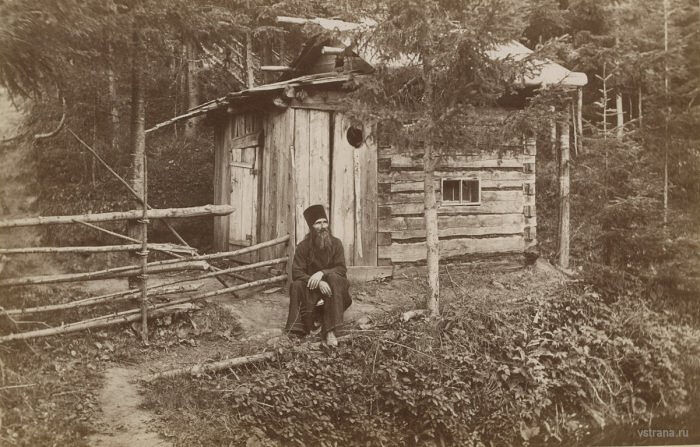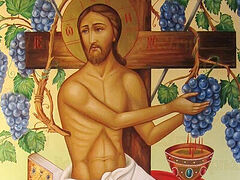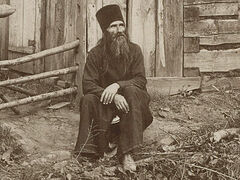St. Stephan affirms the need to adhere to the “guidance of the Orthodox Church alone” in the work of salvation. Salvation is accomplished precisely in the Church. For, “the evil spirit is cunning; it wasn’t hard for him to come up with many means for our ‘salvation’… but only not those that the Lord has legitimized.” However, it’s rare that we come across such statements in the Elder’s writings, probably because this position was self-evident for him and didn’t need to be continually affirmed.
In Fr. Stephan’s understanding, the essence of the spiritual life consists not only in striving to acquire the mercy of God and the salvation of the soul, but also in abiding in real communion with God through the affirmation and active manifestation of faith in Christ. That is why spiritual reflection, going to church, prayer, psalmody, kneeling, frequent sincere Confession and Communion of the Body and Blood of Christ and especially reading and studying Patristic writings and the word of God are important components of the spiritual life that lead to the knowledge of God and, accordingly, to salvation. It should be noted that St. Stephan especially highlights the exclusivity of Sacred Scripture as an expression of the revelation of God. It is precisely Scripture that serves as the starting point in both acquiring and strengthening faith.
Speaking about the path of salvation, St. Stephan very often relies on the teaching of the wide and narrow path (Mt. 7:13-14). According to him, there are only two life paths for man: One brings us nearer to Christ God and leads to blessings and blessed eternal joy, and the other, on the contrary, moves us away from Him, resulting in a curse and eternal torment.
We can trace the origins of this teaching on the two paths in both the Old and New Testaments (Deut. 30:15, Jer. 21:8, 3 Kg. 18:21, Mt. 7:13-14, 2 Pt. 2:2, 15, 21). It may seem that Fr. Stephan based himself on the idea of the “two paths” as expressed, for example, in early Christian works such as The Didache, The Shepherd of Hermas, the Epistle of Barnabas, or numerous Patristic interpretations, but upon closer examination, we see that he independently and quite literally reveals the Gospel teaching about the path to salvation and the path to destruction. This idea is most fully explicated in his book The Two Paths.
Let’s consider his teaching, starting with the broad path. Fr. Stephan teaches that most people take the broad path, which leads to the destruction of the soul inasmuch as it is founded is not only the renunciation of Christ and on human sins, but also on complete concern for this earthly life and, as a consequence, forgetfulness of eternal life. The saint lists categories of people who are going this way. First are those who don’t believe in Christ. Second are Christians who are such only because of their Baptism, who don’t align their lives with Christian teaching and therefore live a rough worldly life, full of lust, covetousness, vanity, and deep indifference to those in need. The third type on this path are those “who, although they understand the truth of God, don’t do it and don’t teach it to others.” The main reason for this, according to the saint, is the lack of love for God and, as a consequence, unbelief in the word of God, which leads a man to estrangement from the life of grace with God and in the end, to eternal destruction.
The narrow path to eternal life lies, on the contrary, in the separation of man from all things sinful and vain and in directly following and imitating Christ. According to the saint, the Lord, being the righteous Judge Who desires the salvation of all, Himself teaches how a man can receive justification from Him. The way that brings us closer to God is the way of the Cross: It leads us into the love of God and adopts us to God. The foundation of this path is faith in Christ the Savior and active service to Him through fulfilling His holy commandments. To walk this path in a salvific manner, we need the constant labor of a temperate and prayerful life, forcing ourselves to goodness and the good-natured patience of various sorrows, which St. Stephan especially emphasizes. The narrow path is also taken by those who had in repentance, “a heartfelt sorrow for their sins.” It is in following this path alone that man can arrive at spiritual-moral perfection, achieve direct unity with God, and come to a state of holiness. Fr. Stephan notes that the narrow path is an indispensable and necessary condition for a genuine Christian life, inasmuch as there is no other path but that indicated by Christ for a man who desires to save his soul. The very walk along the path of the Cross is a direct emulation and following of Christ. Thus, walking along the narrow path leads a man to that ideal of the Christian life beyond which lies eternal and blessed life with God.
It should be noted that such a teaching is especially relevant for our times, when we hear more and more often, even from the mouths of Orthodox Christians, that salvation is possible without strictly following the commandments of Christ and Church piety, that salvation requires only the desire to be “a good person.” Meanwhile, both Holy Scripture (Mk. 16:16, Jn. 3:18, 36) and the Holy Fathers, including St. Stephan, testify to the impossibility of entering into eternal blessed life with God without Christ and His holy Church. Speaking about the path to achieving the goal of the Christian life, the salvation of the soul, St. Stephan builds a consistent system of ascent.
 The narrow path The starting point for him is the word of God and faith in it. Thus, several times he references Sacred Scripture teaching that without faith it is impossible to please God (Heb. 11:6), but faith can come only from hearing the word of God (Rom. 10:17). St. Stephan teaches that salvation itself is impossible for those who neglect the revelation of God, because “no one can fulfill the will of another unless he first learns his commandments.” It was not without reason that the saint advised every inhabitant of his skete to busy himself with reading the word of God. It is precisely reading or hearing Sacred Scripture that is the fount of God-pleasing faith, and as noted earlier, a means of strengthening it.
The narrow path The starting point for him is the word of God and faith in it. Thus, several times he references Sacred Scripture teaching that without faith it is impossible to please God (Heb. 11:6), but faith can come only from hearing the word of God (Rom. 10:17). St. Stephan teaches that salvation itself is impossible for those who neglect the revelation of God, because “no one can fulfill the will of another unless he first learns his commandments.” It was not without reason that the saint advised every inhabitant of his skete to busy himself with reading the word of God. It is precisely reading or hearing Sacred Scripture that is the fount of God-pleasing faith, and as noted earlier, a means of strengthening it.
It's important to note that St. Stephan is not talking about some general faith in God only as Creator—here is meant unconditional faith in Christ the Savior. This is precisely the most important aspect of salvation and the foundation of the aforementioned narrow path, since, based on the word of God, St. Stephan notes that “all those who do not believe in the Son of God are on the path to destruction” (cf. Jn. 3:18). The saint makes similar apologetic statements several times. According to him, faith in God the Savior must be the main value and define the entire life of a man, sanctifying and vivifying it. It is this kind of faith that gives rise to a desire to observe the commandments of God, “to mourn amidst prosperity … and to be comforted amidst suffering by the reward of eternal blessings.”
The next important aspect on the path of salvation is reconciliation with God in Christ. In a way, this is about mutual reconciliation, for God’s reconciliation with us has already taken place in Christ, when God, having become Man, thus united us with Himself and reconciled us with God (2 Cor. 5:18), and called us His brethren (Heb. 2:11). Then, for salvation, a man must willingly receive this reconciliation, which is expressed in a living faith in Christ as Savior; and within this faith he must “subjugate his reasoning to the mind of Christ.” “In order to accept the promise of eternal life from Him, we must be humbled, or what is the same—be reconciled with God,” concludes Fr. Stephan.
True reconciliation with Christ comes only through repentance. Man has fallen away from God through sin, therefore it is only through repentance that he can return to Him. It is precisely repentance that the Lord expects from man—it gives God cause to have mercy on souls. St. Stephan notes that only repentance and a firm intention to change our life and submit it to the commandments of God “give us the right to enter into the habitations of that Most Holy Being, Who hates all who work iniquity” (cf. Ps. 5:6). But a man must not only turn away from his sinful way of life, but must, with God’s help, hate sin itself. “Do not cease repenting; the Lord will help you hate sin; all that is repugnant to the soul cannot last,” St. Stephan admonishes. We must give up our imaginary human “truth” determined by our fallen human reason, repent, and “submit to His will and follow His teachings.” The depths of repentance consist in humility and heartfelt contrition. Without repentance, man remains among the “opponents of Christ,” and having no heartfelt contrition for our sins, we take the broad path to the destruction of the soul.
True repentance in the form of human efforts, according to St. Stephan, is also paired with rebirth from above in the Sacrament of Baptism, in which man is given the possibility of becoming a child of God by grace, of being adopted to God, which must be perfected throughout his entire earthly life. But for man to achieve the fullness of spiritual life and glory, he must make his own efforts. Without true repentance and a change of life, man, although baptized, remains “dead in spirit.” These reflections give an answer to the topical question of why we see so many baptized people in our times who are absolutely not reborn to the spiritual life. Such people are likened to the foolish servant who, having received a talent from the Lord, hid it in the ground (Mt. 25:14-30)—having received rebirth from above in Baptism, they as if again die unto life with God. If such people don’t change their lives, St. Stephan admonishes, they perish for eternity. Formal faith in Christ without actively following His teachings threatens man’s eternal life. According to the saint, only those who lead a spiritual life and do everything in accordance with the word of Christ will be saved. Thus, we can draw the indirect conclusion that the spiritual life of those who are baptized in childhood is subsequently found in spiritual awakening in adulthood, to which St. Stephan calls us.
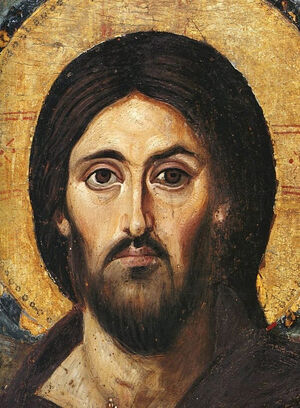 Describing the inner state of a man who has been reborn of the Spirit, St. Stephan writes that in such a man “the heart is warmed … and inflamed with unspeakable love for God.” Such a man preserves the constant memory and joy of God, conquers the world, thinks only about spiritual things, and completely clings to Christ in his spirit, no longer having any cares, and completely placing himself and all his life in the hands of God. In St. Stephan’s understanding, such a man is clothed in Christ and renewed in the image of Him Who created him.
Describing the inner state of a man who has been reborn of the Spirit, St. Stephan writes that in such a man “the heart is warmed … and inflamed with unspeakable love for God.” Such a man preserves the constant memory and joy of God, conquers the world, thinks only about spiritual things, and completely clings to Christ in his spirit, no longer having any cares, and completely placing himself and all his life in the hands of God. In St. Stephan’s understanding, such a man is clothed in Christ and renewed in the image of Him Who created him.
A direct consequence of reconciliation and repentance is the desire “to fervently fulfill the law [of God]” (that is, the commandments). Only the man who “listens to the words of the Lord and submits to His will” ascends to the path of salvation. The saint calls man to willingly fulfill them, as this is direct evidence of the manifestation of the love for God, and as a result, the salvation of man. This is confirmed by the Lord’s indication of the criteria of love for Him: If ye love Me, keep My commandments (Jn. 14:15), and again: If any man serve Me, let him follow Me (Jn. 12:26). St. Stephan calls us to place Christ’s commandments of love for God and neighbor at the foundation of our human relationship and everything that surrounds us. In this case, everything that contributes to this love and unites us with God and our neighbors we must accept; while everything that separates us from them, we must try to avoid. Thus, man must renounce not only sin, but also enslavement to earthly, vain cares.
According to St. Stephan, an important step in turning away from the broad path is renouncing communication with people who don’t live according to the commandments of God. Only in this way is it possible to “imperceptibly find ourselves on the narrow path that leads to eternal life.”
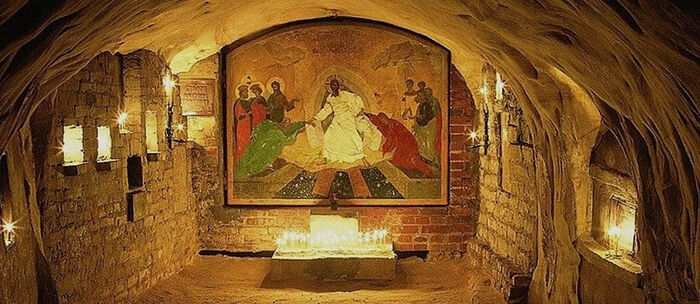 God-built caves at the Pskov Caves Monastery
God-built caves at the Pskov Caves Monastery
Fr. Stephan sees the counterbalance to this communication with worldly people in the desire for silence, for solitude with God. He mainly understands silence as “lack of caring about anything mundane, detachment from vain earthly cares,” renunciation of the vain conversations of worldly men, prudent silence, and solitude. Reinforcing his reflections with the instructions of Sts. Isaac the Syrian, John Climacus, Arsenios the Great, and “Seraphim of blessed memory, the hermit of Sarov,” Fr. Stephan teaches that on the one hand, silence and solitude bring man closer to God, and on the other hand, “in addition to love for God, it is in silence that love for one’s neighbor is perfected.”
The essence of such solitude is prayer, going deeper into the word of God and communion through the Scriptures “with the Lord Himself and with His saints … and with many Holy Fathers who lived before us … and so we can talk with them without any difficulty at any time and at any hour.”
Here we can find a harmony between St. Stephan’s thought and the view, for example, of St. Theophan the Recluse. The Holy Hierarch talks about how solitude is of great significance in the creation of the spiritual life. According to his teaching, there are two types of solitude. Complete removal from the world into the desert is only for men of a mature spiritual age. But another type of solitude—private and temporary—is available and useful for people living in the world. There are moments in the life of any follower of Christ every day when he is alone. These moments must be used for spiritual improvement.
St. Stephan notes that the fullness of silence and solitude can be fulfilled only by people who come to the stature of the fullness of Christ (Eph. 4:13). But solitude is also necessary for “babes in the faith,” who must not only go deeper into the revelation of the Lord but also do everything possible to distance themselves from the vanity of the world, at least for a time, and abide in solitude and silence. Referring to the “wise Metropolitan Philaret of Moscow,” St. Stephan writes that we must do the things that are necessary for earthly life, but at the same time, by means of prayer and pious reflections, we must seek the Kingdom of God, think about God, and cling to God in mind and heart. Without renunciation of the world and communion with a silent, solitary life, man can’t fully understand the danger and perdition of his spiritual state. And it is this realization that brings man into godly sorrow and instills the fear of God in him.

